A new guard is stepping in at Imagination Stage, led by longtime Artistic Director, now Producing Artistic Director Janet Stanford. Rounding out the leadership trifecta are Meghann Babo-Shroyer as Managing Director and Joanne Seelig Lamparter as Artistic Director, Education and Theatre for Change. With these three guiding the next chapter of Imagination Stage, there is a new, reinvigorated focus on community at a time of severe social isolation.
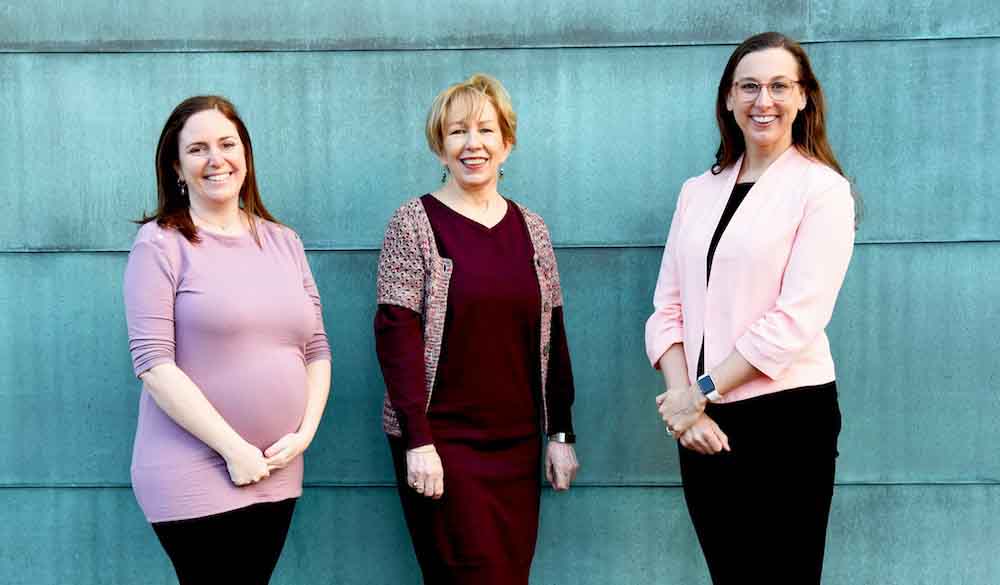
Imagination Stage—the regional arts organization led by Bonnie Fogel for more than 40 years—is a holistic theater arts organization for all children and youth. Through award-winning professional theater, arts education, and community-based theater programming, Imagination Stage develops a deep appreciation of theater arts while building a sense of self and social understanding. It is a place where children are always central to the organization’s purpose. Children are the focus.
DC Theater Arts recently had the opportunity to connect with the new leaders of Imagination Stage to understand how they are pivoting in the time of COVID.
DCMTA: How will COVID-19 change the future of children’s theater? And how has it changed Imagination Stage?
Janet Stanford: COVID is forcing our American culture to do a reset on our values. Denied the usual distractions for families of school, sports, religious gatherings, get-togethers with relatives, and social gatherings in general for almost a year, many children and adults have discovered what we miss most from pre-pandemic life—the chance to connect meaningfully with others, ways to process life’s challenges; the chance to measure my mental state and point of view against yours. In short, we have rediscovered what biology has always known. Humans are social beings with a deep need for exchange and community. In order to self-realize, to grow and thrive, to become whole, children need what the arts uniquely provide.
Joanne Seelig Lamparter: COVID-19 has affected the future of children’s theater in a two major ways: the need to focus on children’s emotional needs and the capacity to connect digitally. COVID has led us to prioritize children even more than ever and we recognize that all children are dealing with trauma due to the pandemic. As a children’s theater we can help children process the world, to see a character overcome an obstacle and realize they have that ability as well, and to seek a sense of optimism. At Imagination Stage, we have been able to prioritize socio-emotional skill-building and trauma-informed practices in how we have interacted with school groups and through our classes. We know kids are incredibly resilient but need support. As a children’s theater we are a vital part of the community and can help provide that support in a young person’s life.
Meghann Babo-Shroyer: Imagination Stage has worked so hard over the years to build partnerships and relationships and foster a real sense of community with students and patrons. That investment has helped us endure the financial hardships of the pandemic when our earned revenue has been cut in half. Not all arts organizations have been so lucky and that may impact the larger field as we move beyond the pandemic. Overall, children’s theaters have sought to be incredibly responsive to this crisis, in a way that supports families, and provides creative outlets to work through this complicated world. When this is all over, we hope that more people will see the creation of, and participation in, theater and art the way we see it—as essential.
Janet: As theater practitioners, we recognize the innate need for exchange and community that humans of all ages have. And as specialists in the developmental needs of young people, we have held firmly onto our role as in-person connectors between artists and kids as well as kids and their peers during these last 12 difficult months. Our class offerings, student performance ensembles, and professional theater work have moved online. We have discovered how to translate to Zoom much, if not all, of what we taught in person. To our great satisfaction, the demand from families, school, and Health and Human Service partners has not dwindled but grown during this time. School administrators and social service providers are acknowledging the necessity of the arts! They are acknowledging that arts contribute not only to children’s enjoyment of their lives but also to their emotional health and well-being.
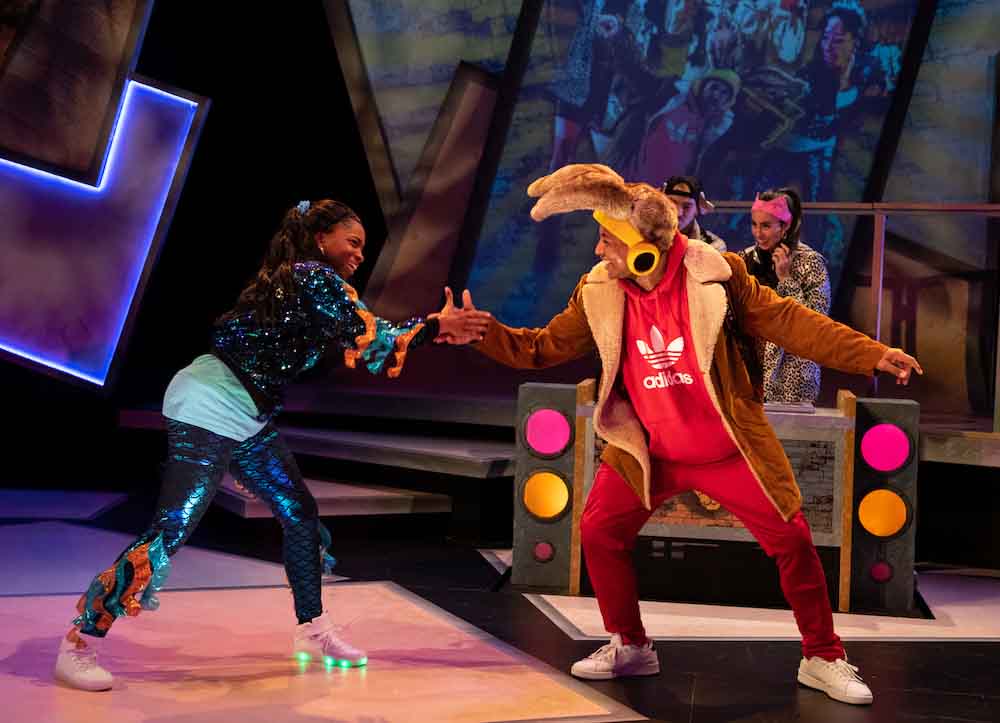
More than ever in the 21st century, live theater and interactive virtual experiences provide the antidote to the alienation kids can feel in a very big, complicated, and often uncaring universe. I believe the big-picture social and cultural value of arts will be understood better as a result of the past year. Neither man nor child live by bread alone, and arts provide the soul, the source of meaning that everyone craves in order to get up in the morning, in order to stay positive and be effective during the day, and in order to dream tonight about a better world we can co-create in the future.
What is Imagination Stage’s Theatre for Change program and what does it stand for?
Joanne: Theatre for Change is about identifying a social justice issue that affects young people and exploring it through theater with the lens of a teen. It’s about amplifying the young person’s voice, as well as bridging cultural divides. The “change” is really social change. Whether it is about sharing the stories of refugee youth, reimagining policing, or finding ways for incarcerated youth to have their voices heard and to be seen in a new light by the community, our Theatre for Change programming is based around community partnerships and interests. All our programming greatly relies on strong partnerships with organizations such as Health and Human Services of Montgomery County, Kids in Need of Defense, Hispanic Heritage Foundation, and many more. These partners provide an expertise such as social work or immigrant rights, and we can collaborate using theater workshops and performances to bring new stories to the forefront, which can plant the seeds for change at a local and national level.
Janet: Often the challenges that young people face with immigration, bullying, or their relationships with relatives, parents, police, or other authority figures are difficult and complex. Young people may feel overwhelmed and confused by their circumstances and may think they are powerless to change them. A drama about these topics can offer a way to study similar problems from a safe distance, to observe a character’s actions and the consequences that ensue. A play provides a way to talk about problems that is less personal and therefore less threatening. It also allows young people who have experienced trauma to recognize themselves as survivors rather than victims.
The mental reset that results from processing issues via a theater experience can be life-changing, transforming the teenager’s sense of helplessness into self-advocacy and empowerment. An image of hope is a powerful icon for a teen who, after seeing the play about a familiar and disturbing dynamic, may finally identify some positive ways to proceed—tell an adult, reach out to a school counselor, family members, or a religious leader. The message of all theater is always “You are not alone. However hard, your experience is not isolated or shameful. There is always a reason to advocate for yourself. There are always adults who care. There is always hope.”

How do you see the role of children’s theater in creating anti-racist social change?
Joanne: We have a great responsibility to the young people we work with and who sit in our audiences. We also have an opportunity to help them imagine a better world and to do so while dismantling the white supremacy that is so much a part of our nation’s history. What gives me great hope is that children have the greatest power to make a difference. When we started touring Óyeme, the beautiful by Miriam Gonzales, our goal was to create change in policy by touring the show to Capitol Hill. And we were lucky enough to have that opportunity. But the real change we saw was from kids themselves. What we saw with touring the show was that students were experiencing a theater production together from very different parts of the city. For example, in the audience we had a group of all immigrant Latino youth watching alongside an all African American group from across the city. The post-show discussion allowed the young people to explore their differences, ask questions, and exchange hopes. On one side of the audience, we had students who had never heard Spanish on stage before and on the other side, students who took pride in understanding the stories being presented on stage and being able to share how they related. That cross-cultural understanding can begin to create change.
Change is the key word. Many of the teens in our programming are a few years away from voting. And we have also seen youth-led movements take great shape. Activists such as Marly Dias and Winter BreeAnne are making positive change every day. With our touring play 10 Seconds by Miriam Gonzales, the hope is that through the post-show discussion and activities, audiences will open up and start to not only be able to discuss racism but imagine change. To be active in understanding what systematic racism is, but also in how to dismantle it. Theater can allow someone to start to dream and to imagine the impossible. That is the beauty of children’s theater. If we can plant the seeds for young people to start to not only stand up for what is right but also stretch their imaginations to start to create the change, we’ve done our jobs.
How will children be affected by this time of pandemic and demand for equity?
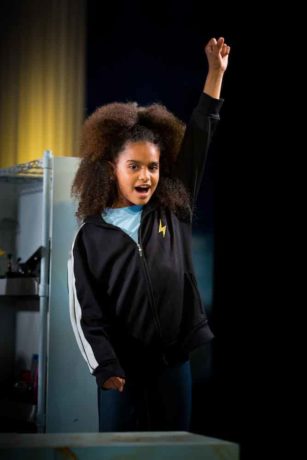
Janet: Children are by nature adaptable and resilient. Like plants, I believe, they grow toward the light. Some kids will have great outcomes and happy memories from the lockdown. Extra family time, a break from the demands of school social life, competition, and work, and more free time for self-directed exploration of their true passions and interests will be remembered as positive. However, it is equally true that the pandemic has highlighted profound and shameful inequities here in the “richest country in the modern world.” The one-in-four children who now suffer from food insecurity, and those who lack internet connections and computers, or who must babysit younger siblings so parents can work—these young people are enduring stresses far beyond what is appropriate for their young years.
Joanne: Children are in real need of connection. We know that the pandemic has led to great inequities in the digital divide, in access to the vaccine, and in access to quality care. Children are also resilient and have the ability to overcome toxic stress (a result of the pandemic). What we know about resilience is that some children can overcome serious hardship while others cannot. The biggest factor in being able to overcome a hardship is based upon having positive relationships with adults. Having that one stable adult—whether a parent, caregiver, or teacher—can make all the difference. By continuing to provide regular programming that is consistent during this time, we are allowing for those positive relationships with an adult to flourish. We have a responsibility to make sure our programming is accessible regardless of barriers so that all children have an opportunity to express themselves creatively and can grow.
Janet: Unlike many grown-ups who have accepted the status quo, I find that kids generally have a tremendous sense of fairness. I like to think that the next generation, in part because of this world crisis they have witnessed, will become advocates for social justice, first in their own communities, and then around the globe. Arts organizations like Imagination Stage must meet the moment and open our programs to all children equally across our community. And I hope that those with the means will understand that it is increasingly their responsibility to make sure that arts, like food and health care, are basic rights for children’s proper survival, not luxuries for only the well-to-do.
When the children in Imagination Stage’s audience are grown, how would you like them to remember this period of their childhood?
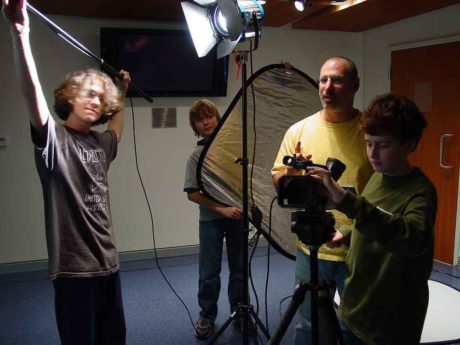
Meghann: Theater is so personal. It’s supposed to be. Good theater, good theater classes, good theater workshops, leave you thinking about the world through someone else’s perspective as you try to mesh it with your own. If you are lucky, those experiences change you and challenge you and uncover pieces of the world for you that you did not know existed before. And those moments are so cool! I hope that the children who engage with us, across our enormous array of programming, get to have those moments because of our work. Theater is magic. Not just because of the sets and the costumes and the lights. It’s magic because of how it makes you feel and what it helps you discover about yourself and your world.
Joanne: When students graduate from our program or think back on a time that they came to the theater, I hope they are proud. Whether they were challenged through an idea or theme in the play or through a new role they had to learn for a class—it can be fulfilling to overcome a challenge in a creative setting. I hope children remember this time not only as a time they overcame challenges but also as fun time. Our programming is joyous and fun. Our classes are filled with laughter. Our virtual field trips are met with smiles. I hope that we are providing an outlet for laughter and creativity while young people are learning from home and social-distanced from friends. I hope they look back at this time and see what they themselves were able to create—whether a Zoom play with peers or learning a Broadway dance with their parents in one of our Family Fun online dance classes.
I am an alumna of BAPA’s Deaf Access Company (now Imagination Stage). When I think back to that time in my life, it was monumental to my growth. I was a teen struggling to fit in at my school and having the relationships from my peers and teacher, the challenge of learning a new language (ASL), and the excitement of performing—it provided me with a new outlook. It gave me new friendships of young people whose culture (Deaf culture) was different from my own, a theatrical experience and training, and a place that felt like a second home to me. I think for many young people, Imagination Stage is that second home. And the wonderful thing about a home—you can always come “home.” Many of our alumni come back to visit. Some end up working on our camps, teaching on our faculty—or in my situation, ending up with a full-time job.
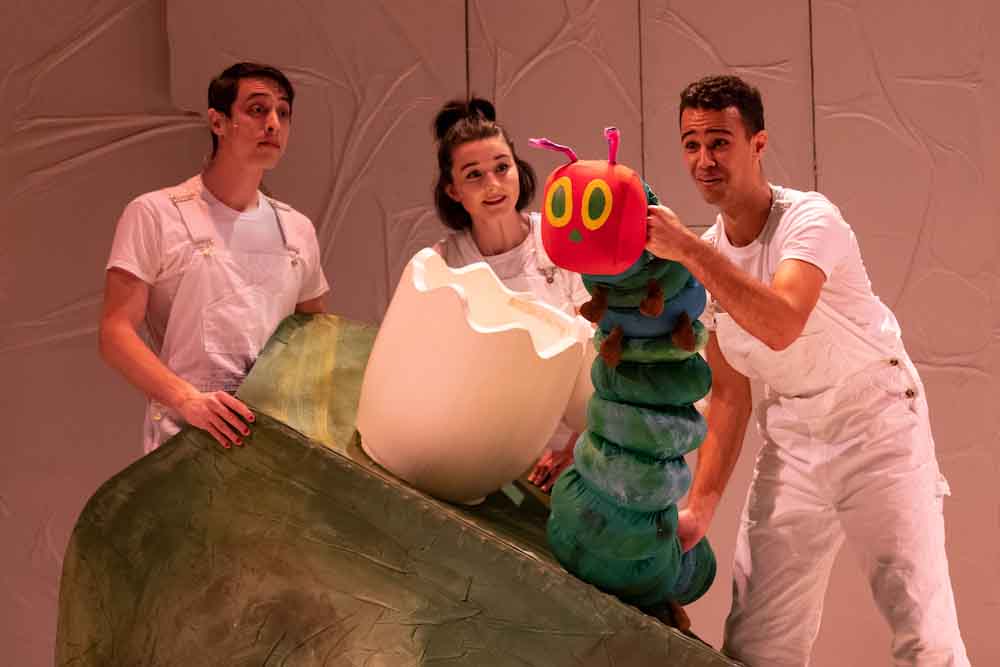
What difference can children’s theater make, given the different world we’re now in?
Janet: Theater is mankind’s greatest-ever invention for teaching empathy.
Stories allow us at all stages of development to walk in the shoes of the other, to identify through our imaginations with people from different walks of life, nationalities, cultures, and religions, past, present, and future. Experiencing theater from an early age and participating regularly introduces children to metaphor and the kind of higher-level thinking that will be ever more essential for human society to thrive in the future. Imaginary heroes and archetypal characters in literature help young people to distinguish good from bad behavior, examine moral dilemmas, and find their own set of values to live by.
As the world becomes more interconnected through social media and shared global problems such as the current pandemic, climate change, and our awareness of the egregious inequities both at home and abroad, the next generation will lean on the wisdom of story to help them create the next chapter. The art of Theatre for Young People builds on ancient lessons of humanity, from fairy tales to new narratives that capture the collective wisdom of our species. Through metaphor, imagery, movement, and music, artists lead us to the epiphanies that will ultimately mark the milestones for our individual journey on this planet.
Joanne: I often imagine the world we want to live in, conceptualizing the creativity needed for the remainder of the 21st century. Collaboration, creativity, and critical thinking are all needed as we move forward in the world. And theater is a wonderful place to flex those skills. Being able to watch a performance and feel for that character who may be different from you, or to take on a new role and literally step inside someone else’s shoes—that will only grow the ability to understand someone else’s feelings.
Meghann: We have the opportunity to make a huge difference. Our audiences and class participants are the next generation, they are the future. And the lessons they learn now will last a lifetime. Theater students learn how to be resilient and think critically, how to be present and listen fully, how to take a note and put in the work, how to be patient and be a part of something larger than one person. Theater patrons absorb many of these same lessons while sitting in the audience. These are all skills that are especially important to learn given the world we live in today. Our focus is never on creating the next Broadway star; we want to help children create and discover the best version of themselves using theater as a tool.
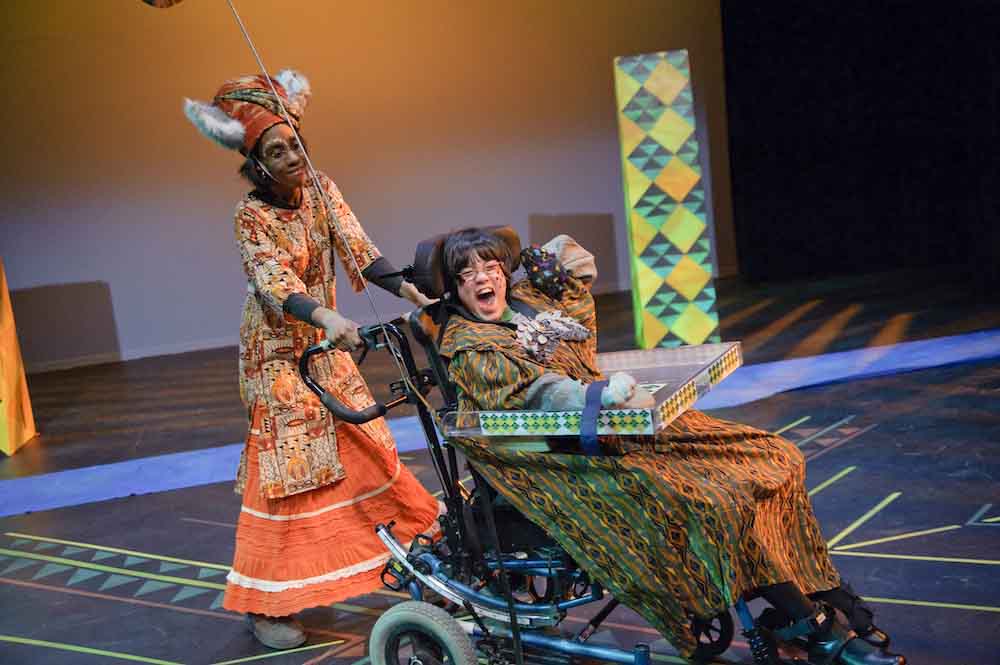
What value does Imagination Stage bring children and the community?
Janet: Imagination Stage is “slow food.” In a world where every child is assigned a number at birth and many of our days feel routine and impersonal, theater arts are here to show children the individual attention every human needs. At Imagination Stage, the artists and teachers appreciate you for your individuality, your capacity to be creative, your personal voice, which is in the process of being formed.
We see children at the youngest ages not as “adults-in-waiting” but as citizens of the world today with rights and responsibilities appropriate to their age. With patience and care, we offer a curriculum of training in self-expression that allows young people to construct meaning for themselves, develop their skills of movement, speech, and imagination in order to best express their feelings and ideas. Our art form by its very nature inspires empathy. Self-confidence, peace of mind, and emotional well-being are the byproducts of our process.
Meghann: We want people to see Imagination Stage as a valuable community member. Our work is a partnership between our organization and the parents and children of our region, and that’s how we program. We listen to the community and create programming that speaks to the needs of families, that supports and honors the whole child. Pegasus, Óyeme, the Youth and Police Program, Sensory Friendly Performances—our history of working this way has led to the creation of programs that are innovative and specific and I hope valuable to our community.
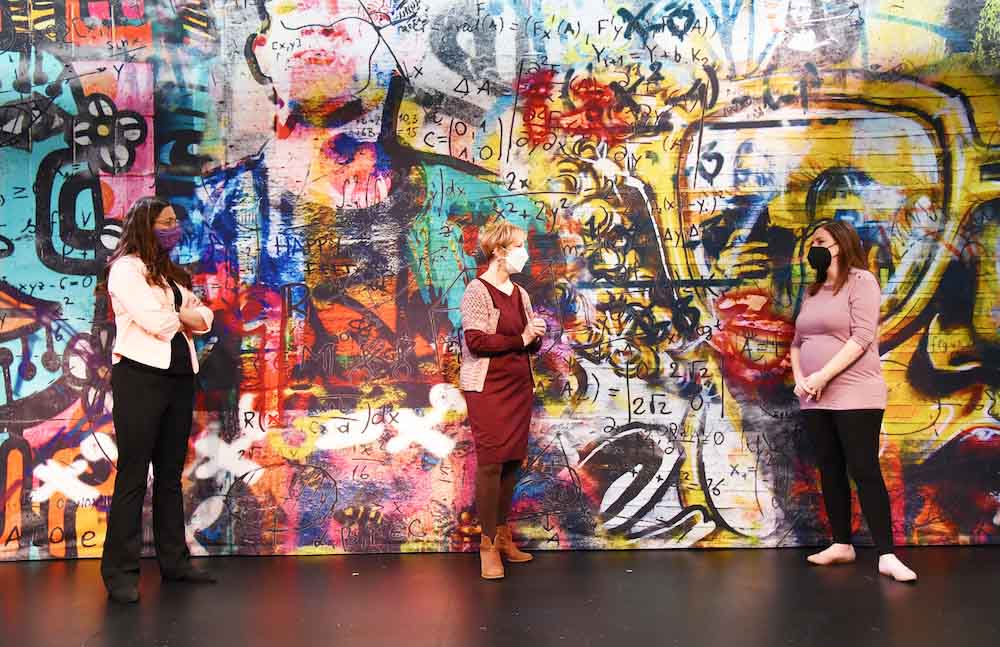
How can parents get involved?
Janet: Understand the profound potential of theater and theater training for your child and recognize that theatergoing is important for your child’s growth and spiritual development, not just another fun distraction! Make it your duty to expose them early and often. Maybe your individual child will prefer sports or other collective activities, but make it a priority to offer them the resource of theatergoing and theater arts classes. If theater is “in their blood,” it will become their mode of self-expression and a source of lifelong learning and inspiration.
Joanne: There are so many ways to experience what we have to offer. Right now, check out our virtual experience, Spy Academy! Sign your child up for a class! Attend one of our Community Conversations online focused on youth development.
Meghann: You can also follow us on social media and share our content, including with those who don’t live in the area—virtual programming means we can reach children from across the country! You can sign up for our email list to stay connected. And, of course, you can donate. Imagination Stage is a nonprofit and 60 percent of our revenue comes from donors who believe in the value of what we’re doing.
SEE ALSO: Imagination Stage strikes gold with ‘Spy Academy & the Lost Treasure of Atlantis’ review by Kendall Mostafavi




